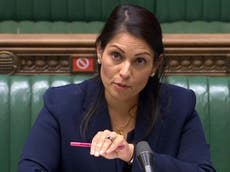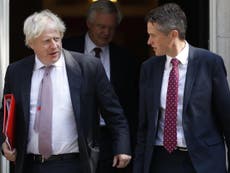The remarkable rise — and potential fall — of Priti Patel
As the home secretary is found to have breached the ministerial code over bullying, Sean O'Grady takes a look at her chequered political career so far


The defining feature of Priti Patel isn’t so much that she is (in her own terms), a “massive Thatcherite”, though she is; nor that she is an exemplar of the benefits of migration, though she is that too; not even that she’s what you might call a “massive bully” stomping around every department she’s occupied yelling things like “why is everyone so f***ing useless?”. No, none of those are the defining thing, though are part of the portrait. Rather the key to understanding our home secretary is that she is just plain wacky. Know that and it all makes a kind of sense.
No doubt she is indeed “furious” about reports in the media that she has been toying with all manner of “mad ideas” to deal with the migrant crisis. The home secretary’s officials have apparently looked at the idea of using wave machines to push refugee dinghies back across the English Channel, which is surely one for the coastguard to offer the benefit of their maritime experience on. There’s even a report that officials might explore building a Trump-style wall across the channel, erm, with holes in it for boats and stuff.
Then there was the claim – not explicitly refuted – that asylum seekers from Syria and Somalia might find themselves transported to some desolate inhospitable outcrop of what remains of the British empire, such as Ascension Island, St Helena, the Shetlands or the Isle Wight – places that time forgot, but at least Shanklin is bit more tranquil than Idlib or downtown Mogadishu. Failing that, these hopeless scraps of humanity could be flown out to Papua New Guinea, Morocco or Moldova.
One thing that can be said about working in Priti Patel’s Home Office is that you certainly get to see the world, if only vicariously through the lived-experience of a starving refugee forced to endure the hard edge of Patel’s re-born hostile environment. The notion that thousands of these wretches could be left to rot on redundant ferries suddenly looks a humane alternative.
It may be unfair, but it’s impossible to ignore the fact that Patel’s parents were themselves once refugees, expelled from Idi Amin’s Uganda back in 1972, the year she was born. Fortunately for them, the Patels, of Gujarati background, were allowed to settle in Hertfordshire whence they built a successful chain of newsagents; had current “blue skies” Home Office thinking prevailed in 1972 then Patel might today be tending a few sheep in the south Atlantic.
To be fair, not all of this executive creativity sprung direct and fully formed from the habitually angry mind of Patel, like Athena from the head of Zeus; but if she thinks a wacky proposal will play well at the Tory party conference she’ll raise it, whatever her annoyingly cautious staff might think. We may indeed hear much more about her war on the dinghy people at the virtual conference in the coming days. She needs some applause after being called out personally by Nigel Farage as soft on immigration.
In fact, she does have an impressive track record of coming up with all kinds of cracked ideas, all on her own. Not since the heyday of Tony Benn has a British cabinet minister terrified their colleagues with such an outlandish talent for the far side.
Take the good old British worker, for example. You might assume that Patel, a true patriot and proud Brexiteer, would have some time for these salt-of-the-earth “left-behind” types, building Global Britain. But no. In a pamphlet published in 2012 called Britannia Unleashed (more like Britannia Unhinged), Patel sniffed that “the British are among the worst idlers in the world”, and ill-prepared to create the post Brexit “Singapore-on-Thames” that, as we all know, is now only weeks away.
That contribution to the wider debate on UK competitiveness and productivity, by the way, betrayed some startling economic ignorance, despite her gaining a degree in the subject. Generally, if you’ll forgive the mansplaining, labour productivity depends on the quantity and quality of capital (machinery, software, technology) available, and thus upon levels of investment, rather than whether people can be arsed to get out of bed in the morning. Her recent misunderstanding of the term “economically inactive” as the workshy, rather than people such as students and pensioners outside the labour market, was another surprise. It might be thought of as another instance of her tendency to see everything through a prism of her own prejudices and to validate her own self image as someone who has worked her own passage to the cabinet table, true though that may be.
It is no coincidence that she mentions Margaret Thatcher in many of her speeches, and she may well do so again this week. Not only is it an easy way to get a kneejerk round of applause, but Patel self-consciously channels the Iron Lady, and has said that Thatcher inspired her political awakening in the 1980s. Sometimes she seems to think she is a sort of reincarnation of Mrs T, the grocer’s daughter with the Victorian values, pronounced work ethic and tendency to dismiss “caring”. You might well think that a little wacky, but it is evident enough.
Some 20 years ago Patel worked as deputy press secretary to William Hague, under Amanda Platell. This is how Platell now describes her Thatcheresque protégée:
“She’s a tough customer, harder than steel – she’s tungsten. She is formidably organised, first in the office and last to leave and often worked seven days a week. She’s well turned out, never self-pitying and driven by the core Tory values she developed working in her father’s corner shops”. Sounds familiar.
But Patel lacks Thatcher’s essential caution. Even Maggie might have drawn back during these Brexit talks from threatening the Irish with a food blockade, evoking the famines of the 1840s. Commenting on a paper that suggested a no-deal Brexit would lead to food shortages in Ireland, the then backbencher Patel commented in 2018 that “this paper appears to show the government were well aware Ireland will face significant issues in a no-deal scenario. Why hasn’t this point been pressed home during negotiations?” After the international diplomatic storm broke, and the deputy prime minister of Ireland called her “ridiculous”, Patel said her comments had been “taken out of context”.
Her most toxic idea, from the point of view of her own career was hatched during her time as secretary of state for international development, a ministry she had previously concluded could be abolished without detriment to anyone. On a “holiday” trip to Israel in 2017 where she met Israeli premier Benjamin Netanyahu, among others, Patel came up with a recommendation to divert Dfid funds to pay for Israeli Defence Force field hospitals in the occupied Golan Heights. Her bigger stupidity was to suppose that the foreign office and No 10 wouldn’t find out about her freelance activities. They did, of course, and Theresa May recalled Patel from a trip to Kenya to sack her in person. As a captivated nation followed the progress of her jet across the Sahara, the Mediterranean and Alps, Patel herself was unaware of the fate that awaited her, even as her future was avidly discussed on the rolling news channels.
It was an self-inflicted setback for this bonsai bundle of ambition who had enjoyed a near uninterrupted progress, and much of it down to her own determination and political passion. She was mad, though morally right, to choose a party that harboured some hostility to people like her. Many in the Conservative Party, notably Enoch Powell, bitterly opposed the arrival of the Ugandan Asians, though Tory prime minister Heath ignored them, and the racists were still around in the Eighties and Nineties, closet or not. Patel later (in 2003) remarked: “I think there are racist undertones and attitudes. Racist attitudes do persist within the party. There’s a lot of bigotry around”. (She’s since complained that that was taken out of context).
Having been there and overcome it, Patel resents Labour MPs of colour telling her what she ought to think. They accuse her of “gaslighting” them by framing her own success as an example of how Britain has changed and how individuals can make the most of opportunities. She told her critics she was “saddened” to be accused of failing to understand the fears and emotions driving the Black Lives Matter movement: “It must have been a very different home secretary who as a child was frequently called a Paki in the playground; a very different home secretary who was racially abused in the streets, or even advised to drop her surname and use her husband’s in order to advance her career.”
Patel, in a controlled explosion, let rip at the press too: “A different home secretary recently characterised, if madam deputy speaker I can say so, in The Guardian newspaper as a fat cow with a ring through its nose – something that was not only racist but offensive, both culturally and religiously.”
Like Munira Mirza, the prime minister’s adviser, for another example, Patel happens to have a different take on racism, and the left do seem unable to cope with it. Patel wants those responsible for chucking the statue of Colston into the water in Bristol prosecuted for criminal damage; no compromises. Her law and order agenda is unmodulated by (what Patel regards as) platitudes and performative gestures about institutional racism. Hence the mutual antagonism.
Her progress to the top of the Tory tree is impressive, given everything, albeit thoroughly in the modern model of party work and lobbying rather than ever having had a “real job” or starting a business of her own. After education at a comprehensive, a degree at Keele and postgrad in politics and government at the highly respected University of Essex, joining John Major’s Tory “opportunity for all” party on the way, Patel interned at Tory HQ, and worked in the press team after Tony Blair crushed them at the 1997 election. She dealt with the media, your correspondent can attest, with efficiency and personal friendliness at the time. The Hague experience must have been pretty dismal though, and Patel skipped HQ, for whatever reason, before New Labour’s entirely predictable second landslide in 2001. During her booze and fags phase (professionally not personally) she moved into PR and at drinks giant Diageo and on the British American Tobacco account at Shandwicks. She was still active in the party, on the modernising wing, and made a “gold list” candidate for a winnable seat on 2006 under David Cameron. She became the first Conservative female Asian MP in 2010, a Treasury minister in 2014 and was promoted to minister of employment, with cabinet rank, in 2015. Theresa May gave her full cabinet rank and her own department, Dfid in 2016, but then came that still inexplicable barmy interference in the Middle East.
What saved Patel’s career was Brexit and her genuine Euroscepticism, born of her Thatcherite instincts. She was one of the six cabinet/cabinet rank ministers who abandoned David Cameron to join the Vote Leave campaign in the 2016 referendum. Like Michael Gove, but unlike Boris Johnson, Patel is a long-term genuine, committed convinced Eurosceptic, and she can prove it. For the one definite break in Patel’s otherwise uninterrupted Conservative affiliation is the two years she spent in the 1990s working for the Referendum Party, a Eurosceptic forerunner of Ukip. Such apostasy was and is no obstacle to advancement, though. By the way, Patel’s father stood as a Ukip candidate for his local council.
At any rate, Boris Johnson is obviously fond of Patel and loyal to her, and catapulted her into one of the “great offices of state” when he came to power last year. Unlike some other Eurosceptics who outlived their usefulness in getting his “oven ready” deal done, such as Theresa Villiers and Theresa May, Patel survived the post-election cull this spring.
Yet her future now is far from assured. The long-awaited official inquiry has found that Patel did indeed breach the ministerial code by bullying civil servants and while the prime minister has decided to stand by her, the subsequent resignation of Sir Alex Allan, Whitehall’s independent adviser on ministerial standards, leaves her in a precarious position. She may still have to face attending an employment tribunal, as a witness (though in reality the accused) which is probably incompatible with her current position. If her former permanent secretary, Sir Philip Rutnam, presses ahead with his claim that he was bullied out of his job and succeeds then Patel would almost certainly have to quit. His account would be coldly destructive of her “shouting, swearing and belittling people”. The lurid stories that would emerge might be too much even for Johnson to face down. Tribunal proceedings are public as are the evidence “bundles”, and her cross examination would be observed by the nation’s media, with some glee. The report of the internal Downing Street inquiry into her supposed serial bullying and bizarre moments is still sitting on the prime minister’s desk, seven months on. You’d think that if it was a clean bill of health it would have been published by now. Covid has overtaken things, but her problems have not gone away. Patel categorically denies all the allegations.
Even if Sir Philip withdrew his claim, Patel’s position is weaker than it should be. For a career politician with a background in PR she has sometimes been a disappointing media performer. She rarely appeared at the Covid press conferences, for example, and when she did seemed unable to pronounce big numbers. She more than once committed the government nonsensically to fight “counterterrorism”. Her “permasmirk” tends to undermine any impression of concern or sincerity. When Andrew Marr admonished her during an interview for “laughing” about Brexit job losses the BBC had to accept that this was in fact the home secretary’s “natural expression”. If so it is unfortunate, and the smirk is easy to slip into “out of context”.
Patel used her speech at the Tory conference last month to remind her colleagues that the grassroots adore her hostile attitude to migration. She told a receptive audience that Britain has a “broken system” on asylum, with migrants “shopping around” to make a claim as they traverse Europe. It is a telling indication of the attitudinal changes in the party that a woman of Asian heritage can be loved by the grassroots. You might say that, sitting for an Essex seat, she embodies the kind of upwardly mobile, self reliant, respect-the-police, heavy patriotic politics that Norman Tebbit used to epitomise, and Patel passes what the old arch Thatcherite once called “the cricket test”. She is a very willing warrior in Britain’s culture wars. She pledged to her audience to tackle what she called “hooliganism and indefensible thuggery” defend Churchill’s statue and the cenotaph and the “hardworking, law-abiding majority who play by the rules”.
Patel has done her best to build a political base in the party in the country, but maybe not such a following in the parliamentary party or those around the prime minister. Dominic Cummings, the PM’s former chief adviser, was reportedly not a fan of Patel, for example, and was reportedly ready to move her in after the famous extra 20,000 coppers recruited and the “points based” immigration bill passed.
Priti Patel’s prospects are inextricably tied to Johnson’s, and he has stoutly defended her. He can be loyal to his friends. However, his own position is becoming demonstrably weaker as each day passes and the twin crises of covid and Brexit intensify. The likes of Gavin Williamson, Robert Jenrick and, to a lesser extent, Patel are the kind of figures he could easily fire to appease his critics in the next reshuffle, jettisoned as ballast as the Boris Balloon deflates. Still, if Johnson is ever evicted you may be sure that Patel will be ready to exploit the opportunity. Her husband Alex Sawyer, who she met through her PR work, calls her “my personal piranha”, and so she is. Maybe the concept of “prime minister Priti Patel” isn’t so wacky after all. Not to her, anyhow.





Join our commenting forum
Join thought-provoking conversations, follow other Independent readers and see their replies
Comments